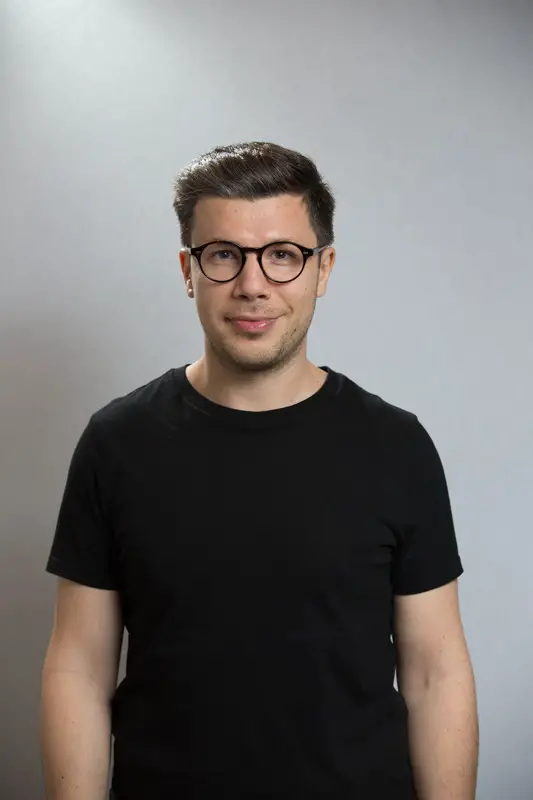Emi Gal, CEO of Teads Studio, Shares the Books That Made Him 'Better, Smarter, Wiser'

Emi Gal is a Romanian software engineer and entrepreneur based in New York, CEO of Ezra AI.
Emi started writing software when he was 12 years old, became a web development freelancer at 14, and founded his first company, Brainient, during his first year in college. He spent the following 10 years building it into one of the leading ad-tech companies in Europe.
Brainient started as a software outsourcing company. He hired a bunch of his friends and got their first clients by bidding for projects on various freelancing platforms.
In the meantime, they were also working on their own ideas. They created an online TV channel called BrainTV – “TV for smart people”. About a year later, they realized they had to shut it down – it was too early for its market and they couldn’t build a big enough audience to monetize the project.
Even though the initial idea failed, one of its features proved to be popular: the ability to interact with the video content using various interactive features. They decided to build a company around that tool, helping advertisers create interactive, personalized online video ads, which in turn increases the engagement and performance.
In September 2016, Brainient was acquired by the American group Teads, one of their clients and the largest video advertising marketplace in the world. Emi relocated to New York City to run Brainient (rebranded Teads Studio) as an independent unit, part of the Teads group, and scale the business globally.
In late 2018, Emi launched his new startup, a cancer research company called Ezra AI.
Emi has an insatiable thirst for knowledge and is one of the fastest learning people I ever had the chance to meet. He’s been taking on a new experiment every year since 2008, such as: testing polyphasic sleep (back in 2008), learning Mandarin, reading a book per week, training his memory with a world memory champion, and many others (you’ll find a complete list here).
Keep on reading to find out more about the books that brought meaning into his life and helped him improve, making him a tiny little bit better, smarter, wiser.
[sc name=”audiointerview” time=”6″]
What’s your favorite book and why? Business and non-business, if possible.
My all-time favorite book is Man’s Search for Meaning by Viktor Frankl, because it shows how even an inmate in a concentration camp can find meaning in life, and I believe having meaning in life is important.
My favorite business book is High Output Management by Andy Grove.
Was there a moment, specifically, when something you read in a book helped you? Can you tell me about it?
I like to think that all the books I’ve read have helped me in some way. High Output Management in particular has really helped me become a better manager.
What books had the biggest impact on you? (perhaps changed the way you see things, dramatically changed your career path)
I can’t say any particular book has had a big impact on me; instead, I like to think that every book I’ve read has made me a tiny little bit better, smarter, wiser.
What books would you recommend to youngsters interested in your professional path? Why? (no number limit here)
Man’s Search for Meaning, Viktor Frankl
The Startup of You, Reid Hoffman
Algorithms to Live By, Brian Christian
100 Years of Solitude, Gabriel Garcia Marquez
[sc name=”subscribe”]
I’m interested in finding out more about your reading habits. How often do you read? In what format?
I don’t read as much as I would like to, that’s for sure. I tend to read books mostly on weekends, as I don’t have time during the week. I have pretty good focus so I’m generally able to sit down for 5-6 hours and read a book.
Do you take notes or have any other technique for conquering the torrent of information?
I highlight a lot, and review the highlights after reading a book. I also ask myself what I hope to get from a book, before I start reading it.
How do you choose what books to read next?
Recommendations from people I trust.
Do you prioritize those recommended by certain people? Is there anyone that you consider a book-recommendations guru?
I prioritize based on topic. I tend to be interested in a certain topic for a few months, go deep on that subject, and then switch to something else.
Last question: what book are you currently reading and what are you expecting to gain from it?
Currently reading Sapiens by Yuval Noah Harari and I’m hoping to gain a better understanding of how humans became conscious beings.
All books mentioned by Emi Gal in this interview:
- Man’s Search For Meaning: The classic tribute to hope from the Holocaust by Viktor E. Frankl
- High Output Management by Andrew S. Grove
- The Start-up of You: Adapt to the Future, Invest in Yourself, and Transform Your Career by Reid Hoffman, Ben Casnocha
- One Hundred Years of Solitude by Gabriel Garcia Marquez
- Sapiens: A Brief History of Humankind by Yuval Noah Harari
- Algorithms to Live By: The Computer Science of Human Decisions by Brian Christian, Tom Griffiths